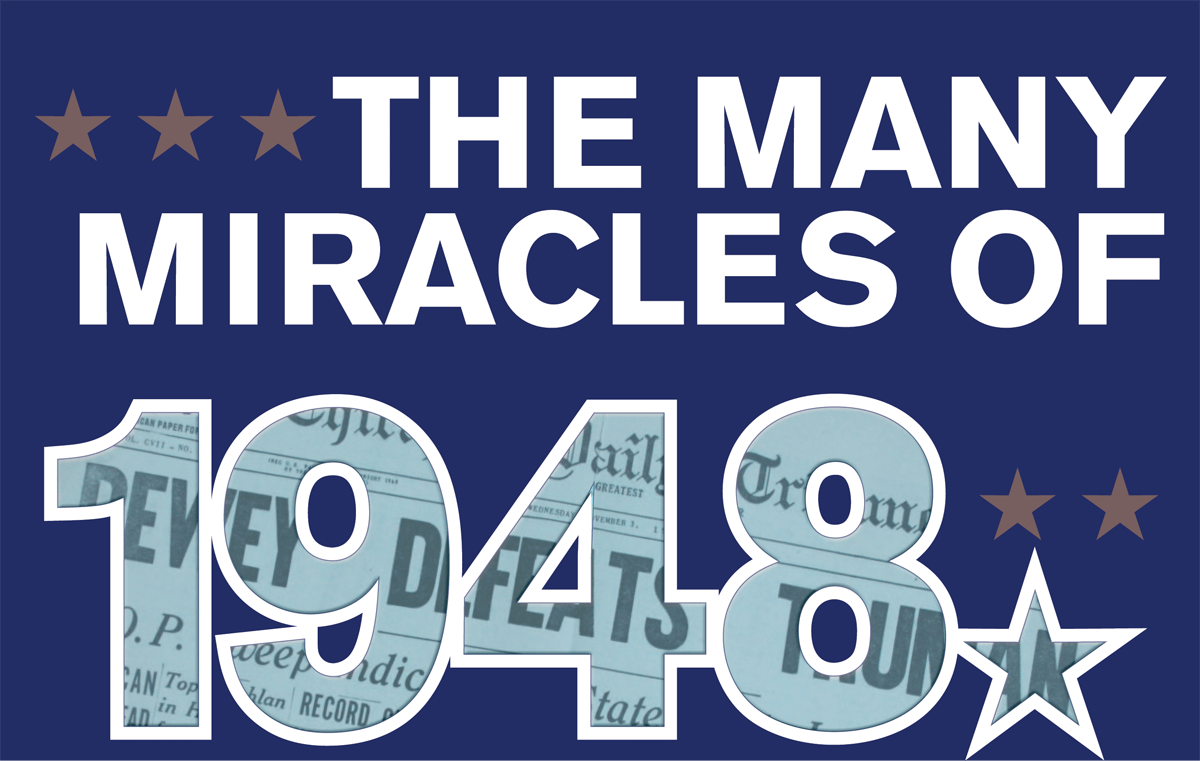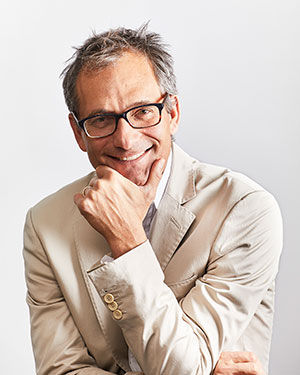The Many Miracles of 1948 | August 28, 2018

70 Years Later, a look back at this history-jammed 12 months

The following piece was contributed by A.J. Baime, author of The Accidental President: Harry S. Truman and the Four Months that Changed the World who is currently working on a book about the 1948 election. It originally appeared in the 1948 Commemorative Issue of TRU Magazine.
In the early evening of November 2, 1948, a secret service car pulled up behind Harry Truman’s home in Independence, Missouri, and scooped up the President of the United States. The car motored north out of town and over the Missouri River. It was Election Night, and Truman had just completed the most exhausting campaign of his life. In the quiet town of Excelsior Springs, he checked into a room alone at the Elms Hotel. Few outside of Mrs. Truman knew of his whereabouts.
Across the country, tens of millions of Americans huddled around radios. Some on the east coast were kneeling in front of their newfangled televisions, watching the news. Already, major publications had named Republican Thomas Dewey the next president. “Government will remain big, active and expensive under President Thomas E. Dewey,” the Wall Street Journal noted. “I predict he [Dewey] will be a first-class President,” wrote the nation’s most popular political columnist, Drew Pearson. As the returns came in, however, it became apparent that something amazing was happening — nothing less than the greatest election upset ever in America up to that time. Meanwhile, Truman sat alone in his hotel room, wearing a borrowed bathrobe and eating a ham and cheese sandwich.
It is often said that all Americans of that era remember exactly where they were and what they were doing on two occasions: Pearl Harbor Day and Election Night in 1948.

Seventy years have now passed since that election, which slammed an exclamation point on one of the most action-packed years in all of time. Besides Truman’s now-famous Whistle Stop presidential campaign and the Chicago Tribune’s momentous “Dewey Defeats Truman” gaff, the year 1948 saw the launch of the Marshall Plan, the Berlin Airlift, Truman’s Executive Order 9981 ending segregation of the military, the founding of Israel, the start of the first Arab-Israeli war, and the shocking Alger Hiss case, which planted the seed of communist paranoia in the hearts of millions of Americans. There was the Treaty of Brussels (a forerunner of NATO), the communist coup in Czechoslovakia, and the atomic bomb tests on Enewetak Atoll in the South Pacific. The first televised political conventions, the founding of NASCAR and the Hells Angels motorcycle gang, the first tailfin on a Cadillac…
In the center of all this horror and excitement was Harry S. Truman, who had no college degree, had never had enough money to buy his own home, and had now been elected to the Oval Office in his own right (he of course succeeded to the office as Vice President following Franklin Roosevelt’s death on April 12, 1945).
When we look back at 1948 seventy years later, what sticks with us most today is conflict with the Soviet Union and the Truman administration’s response. What began as a quarrel between FDR and Joseph Stalin in the spring of 1945 had become, by ’48, the most important phenomenon shaping the geopolitical world. The term “Cold War” had cemented itself in the American lexicon, and many powerful figures in Washington believed that all-out war with the USSR was inevitable. It was just a matter of time.
In 1948, the Central Intelligence Agency and the National Security Council were brand-new products of the National Security Act of 1947. Today, a look at documentation from these organizations opens a remarkable window on the world of 1948. On Election Day that year, a draft report by the National Security Council made the following prediction: “The will and ability of the leaders of the USSR to pursue policies which threaten the security of the United States constitutes the greatest single danger to the U.S. within the foreseeable future.
Communist ideology and Soviet behavior clearly demonstrate that the ultimate objective of the leaders of the USSR is the domination of the world.”
Many believed that Stalin was poised to invade Western Europe and that he would charge his Red Army through Greece and Turkey into the Middle East. In a document dated July 30, 1948, the CIA envisioned what a response would be from the U.S., in such a case: “The Western Powers would undertake immediate counteraction, including maximum employment of U.S. air power, using the atomic bomb at least against Soviet targets.”
It was a scary world indeed, and Truman would later say that his number one priority — above winning the election, above anything else — was “to prevent a third world war.”

What to do? In 1947-1948, the Truman administration came up with the Truman Doctrine and the Marshall Plan. It is hard for many to understand today just how radical these foreign policies were at the time: To give billions and billions of taxpayer dollars to nations that had been crushed by the war and were at risk of communist infiltration, in the hopes that this money would help these nations rebuild themselves so they could stand on their own and embrace democracy. It was the biggest handout of all time. Henry Wallace, a former vice-president and a third-party candidate in 1948, openly predicted that the Truman Doctrine and Marshall Plan would cause war with the USSR. Many in America agreed, including some powerful figures on Capitol Hill.
Truman once said that the problems he faced as president were so unprecedented, it would take 50 years before we would know whether his decisions would prove to be good ones. Historians today agree almost unanimously that the Truman Doctrine and the Marshall Plan proved efficacious if not ingenious. They remained key to American foreign policy for decades. And in fact, we never did have a third world war.
Would the outcome have been the same, if in fact Dewey had defeated Truman in 1948? We can never know.
Today the world is once again caught in a web of historic narratives, many of them as dangerous as those of 1948. The Trump administration is attempting to reenvision American foreign policy more radically than at any time since 1948. Will the Trump administration’s new policies be as far-sighted as Truman’s were 70 years ago? Like Truman said, it may take 50 years before we know for sure.
This story originally appeared in the 1948 Commemorative Issue of TRU Magazine, a magazine delivered free to Truman Library Institute members.
Join our email list to receive Truman updates right in your inbox:


